|
|
|
Sort Order |
|
|
|
Items / Page
|
|
|
|
|
|
|
| Srl | Item |
| 1 |
ID:
121533
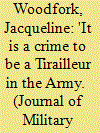

|
|
|
|
|
| Publication |
2013.
|
| Summary/Abstract |
Uniquely among European colonies, some indigenous inhabitants of the French West African colony of Senegal were made citizens of the metropole in the nineteenth century. This originaire status, as it was known, allowed them to, among other things, elect a member of the French parliament in Paris. But, the civil status of the colonial population of Senegal also influenced how its members who served in France's West African colonial army, the Tirailleurs sénégalais, were fed, clothed, housed, and paid. Using oral and archival sources, this article looks at how this cleavage between citizens and subjects influenced the relationship of Senegalese soldiers to the colonial state, the military, their officers, and each other.
|
|
|
|
|
|
|
|
|
|
|
|
|
|
|
|
| 2 |
ID:
124263
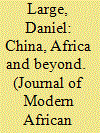

|
|
|
|
|
| Publication |
2013.
|
| Summary/Abstract |
Not so long ago, it was common to af?rm that China was the most important development in Africa's politics and international relations since the end of the Cold War. Now, after an upgrade, China is commonly held to be the most important development for Africa in the twenty-?rst century. In a relatively short period of time -Beijing's Year of Africa in ???? was also the year when China's relations with the continent acquired global visibility thanks in large part to the third Forum on China Africa Cooperation- the theme of China-Africa has been catapulted out of the mostly overlooked margins and into the conspicuous mainstream of all kinds of attention. The tour of Tanzania, South Africa and the Republic of Congo by China's President Xi Jinping in March ???? and that of US President Barack Obama to Senegal, South Africa and Tanzania some three months later stimulated more attention. It demonstrated the diverse varieties of critical and celebratory interest in media and social media coverage, as well as a growing body of China-Africa ?lms and ?ction.
|
|
|
|
|
|
|
|
|
|
|
|
|
|
|
|
| 3 |
ID:
123506
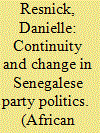

|
|
|
|
|
| Publication |
2013.
|
| Summary/Abstract |
Senegal's 2012 presidential and legislative elections reaffirmed the country's longstanding reputation as one of Africa's most stable democracies. The elections also represented a critical juncture for the country's party system, demonstrated by the use of new campaign techniques as well as the gradual exit from the political scene of an older generation of elites. At the same time, this article argues, the elections revealed continuing weaknesses within the party system, including low levels of institutionalization and the limited ability of the opposition to mobilize key constituencies, such as underemployed urban youth. These trends are demonstrated through disaggregated election data that show a high degree of electoral volatility and party de-alignment as well as low levels of voter turnout. Thus, while Senegal has now achieved the two rounds of party turnover often deemed to be an important indicator of democratic consolidation, the elections also revealed that a vibrant, pluralistic party system can nonetheless fail to engage citizens over time.
|
|
|
|
|
|
|
|
|
|
|
|
|
|
|
|
| 4 |
ID:
113175
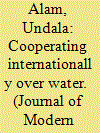

|
|
|
|
|
| Publication |
2012.
|
| Summary/Abstract |
Since the early 1960s, Guinea, Mali, Mauritania and Senegal have cooperated over the Senegal river. Contrary to the norms of managing international rivers, the riparians have subjugated their sovereignty and incurred national debt to jointly develop the benefits from their shared river, despite intra-basin tensions and conflict. The Senegal experience highlights an alternative path to tackling the consequences of climate change, poor water management and increasing demand. In seeking to explain the intensity of international cooperation displayed in the basin, this article examines the characteristics of international rivers and the Senegal basin's history, and concludes that Pan-Africanism, francophonie and the political leaders' attitudes to regional cooperation shaped l'espace OMVS.
|
|
|
|
|
|
|
|
|
|
|
|
|
|
|
|
| 5 |
ID:
122787
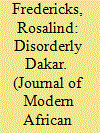

|
|
|
|
|
| Publication |
2013.
|
| Summary/Abstract |
During the era of President Abdoulaye Wade, a household waste crisis periodically held the streets of Dakar in its noxious grip. This paper analyses the crisis in light of waste management's role as a fundamental urban public service, key employment sector, and visceral symbol of the city's management. It examines how the institutional landscape of waste management took centre stage in a power struggle within the state that centred on reconfiguring the labour of ordering the city. At the same time, it reveals how the waste-workers' union emerged as one of the most visible and savvy labour movements in contemporary Senegal. Through the creative disorder unleashed by intentional acts of dirtying, workers and residents alike forged new claims to the city. Conclusions are drawn for the wider implications of the disorderly city for the urban question in Dakar and the landscape of citizenship in Senegal's contemporary period.
|
|
|
|
|
|
|
|
|
|
|
|
|
|
|
|
| 6 |
ID:
190771


|
|
|
|
|
| Summary/Abstract |
Through semi-structured interviews with Senegalese fishermen, this article examines their displacement following the depletion of fishing stocks in Senegalese waters owing to the activities of European and Asian industrial fleets over the last two decades. While there has been some recognition in scholarship that extractivism leads to dire precarity and displacement within local populations, it has not been demonstrated how exploitations at sea are dependent on the displacement of the indigenous people for corporate gains. Thus, this article conceptualizes displacement of local Senegalese fishermen as the product of an active, arguably deliberate process, solely motivated by corporate gains to the detriment of their communal and human life. Furthermore, the article shows that displacement can take on multiple forms such as economic and temporal as well as physical movement. Data is drawn from eighteen semi-structured interviews with fishers from three fishing villages.
|
|
|
|
|
|
|
|
|
|
|
|
|
|
|
|
| 7 |
ID:
152760
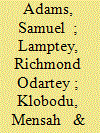

|
|
|
|
|
| Summary/Abstract |
This article examines the effects of capital flows on economic growth in Senegal using autoregressive distributed lag (ARDL) over the period 1970–2014. Overall, our results show that remittances cause economic growth in Senegal in the long run. In contrast, external debt has a negative impact on economic growth. The ARDL results, however, show no cointegration between aid and growth or between foreign direct investment (FDI) and growth. The Quandt–Andrews breakpoint test selects year 1991 as the most likely breakpoint location for the remittances–growth equation. Finally, time-varying parameter analyses using the year 1991 as a slope dummy reveal that remittances have been growth-enhancing post-1991. Therefore, government and policy makers in Senegal must create a favourable atmosphere for attracting more remittances to promote economic development.
|
|
|
|
|
|
|
|
|
|
|
|
|
|
|
|
| 8 |
ID:
169770
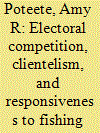

|
|
|
|
|
| Summary/Abstract |
Political clientelism is generally seen as an obstacle to democratic governance and inclusive development. The politics of access to Senegalese fisheries suggest a more nuanced relationship between elections, clientelism, responsiveness, and inclusion. Even where clientelism is pervasive, it takes different forms and interacts with electoral competition to influence the direction and form of political responsiveness. When elections are highly uncompetitive or when electoral turnover is highly likely, elections do little to constrain incumbents or discourage elite resource-grabbing. When electoral competition renders outcomes uncertain, however, politicians face incentives to court potentially influential blocks of voters with promises of decentralized clientelism. This article traces connections between the intensity of electoral competition and the politics of access to Senegalese coastal fisheries since the 1990s, focusing on the period before and after Senegal’s second electoral turnover in 2012. It argues that, while electoral competition may not reduce the prevalence of clientelism, it can influence whether national elites or ordinary voters are the main beneficiaries.
|
|
|
|
|
|
|
|
|
|
|
|
|
|
|
|
| 9 |
ID:
127238
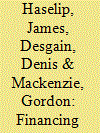

|
|
|
|
|
| Publication |
2014.
|
| Summary/Abstract |
The article presents the findings of primary research carried out in Ghana and Senegal, which revisited the main assumptions behind the African Rural Energy Enterprise Development (AREED) initiative (2002-2012), and other donor-backed programmes, designed to promote small and medium-sized energy enterprises (energy SMEs). These assumptions were (1) that the lack of affordable local financing presented the most significant barrier to setting up and expanding energy SMEs, and (2) that these barriers would be overcome by a 'demonstration effect' whereby successful businesses, supported by donor-backed programmes, could in turn influence the commercial financial sector to invest in energy SMEs, thus triggering a virtuous circle of growth and profitability.
|
|
|
|
|
|
|
|
|
|
|
|
|
|
|
|
| 10 |
ID:
137924
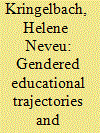

|
|
|
|
|
| Summary/Abstract |
French colonialism resulted in the inclusion of large numbers of West Africans into French educational institutions. Furthermore, the Senegambian region has a long history of intermarriage with French citizens. This paper draws on this history to explore the interplay between migration, education and binational marriage over several generations of West African students, with a particular focus on Senegal. Students from Francophone countries continue to seek educational opportunities in France, but in recent years they have been increasingly affected by the tightening up of immigration policies. In this context, this paper suggests that marriage to a French spouse often plays an important role in the fulfilment of educational projects, and that this role is contingent on issues of gender and class. At times, however, tensions between marriage in France and social expectations back home end up compromising education altogether.
|
|
|
|
|
|
|
|
|
|
|
|
|
|
|
|
| 11 |
ID:
104116
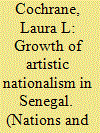

|
|
|
|
|
| Publication |
2011.
|
| Summary/Abstract |
In the 1960s, Senegal's first national leaders narrowly defined how artists should practise nationalism through their work, particularly in the weaving craft, and enforced this definition through selective state patronage. This ideological and stylistic control echoed state control over economic markets. As subsequent administrations have restructured the economy, leading to a powerful informal business sector, so have independent contemporary weavers redefined artistic nationalism. Using ethnographic and archival interviews, this article examines nationalism in Senegalese weaving, placing the perspectives of contemporary weavers alongside those of two arts administrators who helped to develop state-sponsored programmes in the 1960s and 1970s. I argue that contemporary weavers find inspiration from Senegalese nationalism of the mid-twentieth century, yet have modified it to encompass individual expression. Because definitions of artistic nationalism in Senegal have shifted, it remains a significant ideology within the national arts scene.
|
|
|
|
|
|
|
|
|
|
|
|
|
|
|
|
| 12 |
ID:
108609
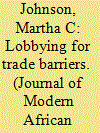

|
|
|
|
|
| Publication |
2011.
|
| Summary/Abstract |
Over the last two decades, developing countries have lowered trade barriers considerably. As a result, they have experienced a surge in food commodity imports. In Ghana, Senegal and Cameroon, a flood of frozen poultry imports in the late 1990s and early 2000s threatened domestic poultry producers. In response, they organised to demand protectionist measures. This article examines why the Cameroonian and Senegalese governments responded to these demands while the Ghanaian government did not. Employing data from interviews in Senegal, newspaper coverage in all three countries, and documentation from non-governmental organisations, it argues that Cameroonian, and to a lesser extent Senegalese, producers were able to influence government policy because they faced few barriers to collective action and built alliances with consumers before lobbying government. The findings suggest that a public choice, interest group-focused approach is still useful for explaining policy outcomes in West Africa.
|
|
|
|
|
|
|
|
|
|
|
|
|
|
|
|
| 13 |
ID:
130394
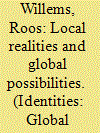

|
|
|
|
|
| Publication |
2014.
|
| Summary/Abstract |
Recent studies show that the numbers of aspiring migrants continue to be on the increase worldwide not only in the typical emigration countries in the South but also in the usual destination countries in the North. Yet, while migration theorists have recently included the micro perspective of individual agency and sociocultural logics in their search for the engine behind the migration flows, far less research has been done on the sociocultural embeddedness of the imaginations of aspiring migrants, most of whom will never migrate. In Senegal, an increasing large number of men and women are very focused on transnational migration. This article tries to unravel the knot as to what lies at the core of this seeming national preoccupation with migration out of Senegal. Its conclusion suggests that the pervasive desire of so many is rooted in the way in which the economic claims of family members and friends are culturally informed.
|
|
|
|
|
|
|
|
|
|
|
|
|
|
|
|
| 14 |
ID:
095115
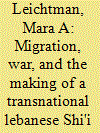

|
|
|
|
|
| Publication |
2010.
|
| Summary/Abstract |
The July 2006 Lebanon war was an important turning point for West African Lebanese. For the first time since their formation as a community, the Lebanese in Senegal organized a demonstration in Dakar displaying solidarity with Lebanon. This protest illuminates the dynamics between global forces and local responses. Hizbullah's effectiveness in winning the international public opinion of both Sunni and Shi?i Muslims in the war against Israel led to a surge in Lebanese diaspora identification, even among communities who had not been similarly affected by previous Lebanese wars. By analyzing the role of a Lebanese shaykh in bringing religious rituals and a Lebanese national identity to the community in Senegal, this article explores how members of the community maintain political ties to Lebanon even when they have never visited the "homeland" and sheds new light on the relationship among religion, migration, and (trans)nationalism.
|
|
|
|
|
|
|
|
|
|
|
|
|
|
|
|
| 15 |
ID:
127760
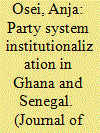

|
|
|
|
|
| Publication |
2013.
|
| Summary/Abstract |
This paper presents a comparative case study of party system institutionalization in Ghana and Senegal. Both countries experienced a democratic change in government in the year 2000, but while positive development has continued in Ghana, democratic quality in Senegal decreased over time. Can the concept of party institutionalization help to explain this diverging development? Four dimensions of party system institutionalization are systematically compared: regularity, social roots, legitimacy, and party organization. It is found that party competition in Ghana is characterized by high stability and a low number of parties. The major parties are organized throughout the country and have definable support bases with deep historical roots. They give orientation to voters and are perceived as legitimate actors. In Senegal, in contrast, the party system is fluid and less predictable. Parties are not structured along social cleavages and many of them are weakly organized and highly personalistic. In summary, the case studies support the assumption that an institutionalized, well-structured party system in which relevant social cleavages are translated into electoral alternatives is positively related to democratic quality.
|
|
|
|
|
|
|
|
|
|
|
|
|
|
|
|
| 16 |
ID:
114197
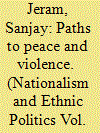

|
|
|
|
|
| Publication |
2012.
|
| Summary/Abstract |
Democratization has been heralded as both a "curse" and "cure" for ethnic conflict. Using a comparative analysis of ethnic conflicts in Senegal and Nicaragua, this article makes the case that the breadth of accommodation provided by a central government following democratization is a key variable that can provide a deeper understanding of why conflict sometimes worsens and sometimes ameliorates. By adopting a framework that conceptualizes the range of accommodation provided to territorial minority ethnic groups in advanced capitalist democracies as falling into three general categories, "loyalty," "voice," and "recognition," the article illustrates that using a combination of these three strategies helped Nicaragua quell violent ethnic conflict. On the other hand, the conflict in Senegal continued because the newly democratic government refrained from using strategies to provide "voice" and "recognition" for the Diola minority.
|
|
|
|
|
|
|
|
|
|
|
|
|
|
|
|
| 17 |
ID:
179118
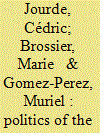

|
|
|
|
|
| Summary/Abstract |
This article analyses how the state in Senegal has managed the hajj since the liberalisation era in the early 2000s. Although the essence of the hajj is religious, it is also deeply political and requires that the state manages complex relations with pilgrims, religious leaders, private travel agencies, politicians and Saudi authorities. This article argues that three inter-related imperatives structure the conduct of the Senegalese state: a security imperative, a legitimation imperative, and a clientelistic imperative. Security concerns lead the state to monitor and control pilgrims travelling to Mecca. Legitimation is seen in the collaborative relations with Sûfi orders and in the framing of the hajj organisation as a ‘public service’. Finally, given the magnitude of financial and symbolic resources attached to the hajj, clientelistic relations are constitutive of state officials’ actions. Overall, despite the post-2000 liberalisation of the hajj, the state has maintained its role as a gatekeeper, regulator and supervisor.
|
|
|
|
|
|
|
|
|
|
|
|
|
|
|
|
| 18 |
ID:
157069
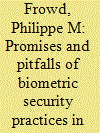

|
|
|
|
|
| Summary/Abstract |
West African states like Senegal are increasingly turning to biometric technologies for border security. In this article I argue that this trend results from the construction and circulation of knowledge about biometrics by a transnational field of security professionals, assembled through official publications as much as through professional practices such as workshops. I argue that this biometric ideal rests on the promise to states in the global south that these technologies enable “smarter” and more efficient borders, enhance prestige, and facilitate states’ integration into global security arrangements. I go on to argue that, although the biometric ideal is often shared by security professionals in the North and South alike, the implementation of biometrics themselves is riddled with failure. These failures are revelatory and stem as much from the technical limitations of biometrics’ border security applications as they do from relations of competition and disaggregation between local security professionals. Drawing on fieldwork in Senegal, I use the country’s entry-exit system and biometric documents to give a view of the everyday practices behind the deployment of security technologies in the country. In doing so, I contribute to research on biometrics in West Africa by adding a focus on these technologies’ security implications.
|
|
|
|
|
|
|
|
|
|
|
|
|
|
|
|
| 19 |
ID:
193106
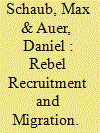

|
|
|
|
|
| Summary/Abstract |
We investigate whether the threat of recruitment by rebel groups spurs domestic and international migration. The existing literature on wartime displacement has largely focused on potential victims of violence. We argue that alongside potential victims, we should expect to see the out-migration of individuals who are attractive to the rebels as potential recruits. To test this hypothesis, we draw on original survey data collected in the context of the MFDC insurgency in southern Senegal. Causal identification stems from instrumenting recruitment threat with the density of the local forest canopy cover. Analyzing data from 3,200 respondents and over 24,000 family members, we show that individuals who fit the recruitment profiles of rebel groups are more likely to leave and be sent away by their families. Our paper contributes micro-evidence for a mechanism linking violent conflict to migration, which so far has received scant attention, and provides a deeper understanding of the composition of refugee flows.
|
|
|
|
|
|
|
|
|
|
|
|
|
|
|
|
| 20 |
ID:
103055
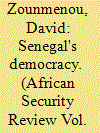

|
|
|
|
|
|
|
|